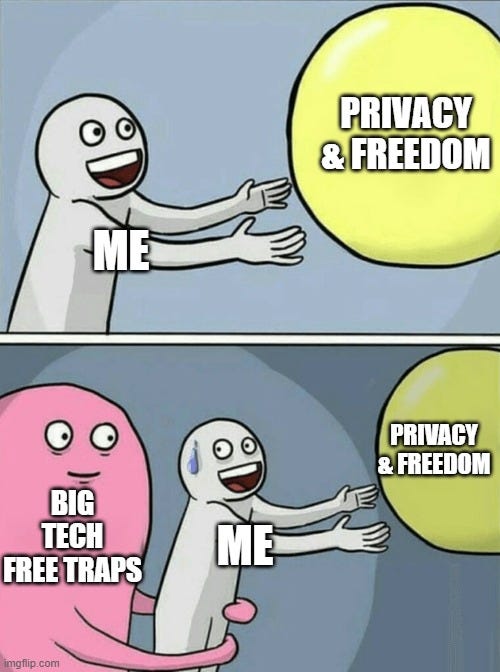Privacy Friendly Photo Storage
Why storing photos with Google and Big Tech puts your privacy at risk. And what you can do about it.
Online photo storage solutions from Big Tech providers like Google are a classic privacy-convenience balancing act. Their services are extremely convenient, free and hard to resist. But in the AI age, they come with significant privacy risks, as we’ll see below. In the end, relying on Big Tech for photo storage means giving them the power to control and potentially exploit your personal memories. Fortunately there are privacy friendly alternatives if you’re concerned about these privacy risks.
Welcome to another issue of Secrets of Privacy where we discuss internet privacy related topics and provide practical tips to immediately enhance your privacy.
If you’re reading this but haven’t yet signed up, join the Secrets of Privacy community for free and get our newsletter delivered to your inbox by subscribing here 👇. Upgrade to a paid subscription for less than $0.25 per day.
Privacy Implications
Online photo storage from Big Tech providers like Google and Apple pose several key privacy risks, including:
1. Targeted Advertising: Big Tech companies use metadata and the content of your photos to fine-tune their advertising algorithms. Your personal images become a tool for profit-driven surveillance, feeding into a larger system of data harvesting that makes you the product.
2. AI Training Without Consent: Photos stored on these platforms can be used to train AI models. These models, in turn, might be sold or used in ways that you would not approve of. The photos you upload may be repurposed for product development, facial recognition databases, or other AI-driven applications, all without your explicit permission.
3. Data Ownership and Loss of Control: When you store your photos with a Big Tech provider, you’re often agreeing to terms of service that give the provider a broad license to use, analyze, and potentially share your content. This effectively relinquishes your control over personal and sensitive memories.
4. AI Scanning and Account Termination: Google and similar companies use AI to scan images for policy violations. Innocent photos may be flagged due to AI errors, and accounts can be locked or disabled, leading to a permanent loss of access to all your files, including photos. This can happen without any opportunity to appeal, leaving users in a vulnerable position.
Additional Privacy Risks
AI isn’t the only privacy risk when storing your photos with a Big Tech provider like Google or Apple. Most Big Tech companies are overly cozy with law enforcement. They also are high risk targets for hackers due to the massive amounts of personal data stored in their systems.
Law Enforcement Requests: Big Tech companies like Google often share data with law enforcement, even without a warrant. This could include access to your photos, making them a potential point of surveillance if the government suspects any wrongdoing. While this is sometimes justified in criminal investigations, innocent users could still have their privacy violated if their photos are misinterpreted or flagged in error.
Data Breaches and Hacks: Large corporations are frequent targets for cyberattacks. Hackers may attempt to steal photos or personal data from their servers, and even the best-protected systems aren't immune to breaches. This puts your personal memories at risk of being exposed, sold, or exploited.
AI scams are here and getting more sophisticated. One of the best things you can do to protect yourself is to remove your personal information from Google and the data broker sites. That starves the scammers of vital information, making you a much harder target. You can DIY, or pay a reasonable fee to DeleteMe to do it for you. Sign up today and get 20% off using our affiliate link here. We’ve used DeleteMe for almost five years and love it for the peace of mind. It’s also a huge time saver.
How to Protect Yourself





